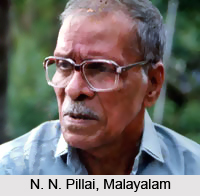 N. N. Pillai was a renowned dramatist, actor as well as director of Malayalam Theatre. He did away with the divide between the professional and amateur in Malayalam theatre. Pillai was born in Vaikam, Kottayam district in 1918. As a boy N. N. Pillai displayed talent in acting. He did not complete college, but joined the Indian National Army as a soldier fighting the British in Malaya during World War II. N. N. Pillai worked as a journalist before forming the Viswakerala Kala Samiti in 1953 to propagate a different type of stage performance drawing heavily from fantasy and dream. This depends mostly on powerful, witty, ironic dialogue, and breaking moral boundaries.
N. N. Pillai was a renowned dramatist, actor as well as director of Malayalam Theatre. He did away with the divide between the professional and amateur in Malayalam theatre. Pillai was born in Vaikam, Kottayam district in 1918. As a boy N. N. Pillai displayed talent in acting. He did not complete college, but joined the Indian National Army as a soldier fighting the British in Malaya during World War II. N. N. Pillai worked as a journalist before forming the Viswakerala Kala Samiti in 1953 to propagate a different type of stage performance drawing heavily from fantasy and dream. This depends mostly on powerful, witty, ironic dialogue, and breaking moral boundaries.
N. N. Pillai`s puns created instantaneous laughter but his biting sarcasm hurt the feelings of many sections while amusing others. N. N. Pillai created a startling drama, Kapalika i.e. `Witch` in 1971. This play was about the life of a prostitute in Bombay. That he, his wife, and daughter acted in it discomfited audiences. His other important plays were Atmabali i.e. `Self-sacrifice` in 1965, Pretalokam i.e. `World of Ghosts` in 1965, Wine Glass in 1966, NOC i.e. `No Objection Certificate` in 1967, Manvantaram or `Ages` in 1967, etc. some others can be mentioned as Esvaran arrestil i.e. `Divinity under Arrest` in 1967, Marichika or `Mirage` in 1968, Nan svargattil i.e. `I`m in Heaven` in 1969, Climax in 1969, Godfather in 1972, Supreme Court in 1979, and To Be or Not to Be in 1979. Originally staged by Pillai`s professional troupe, they were widely revived by amateurs. N. N. Pillai performed excellently in varied roles such as a zamindar in Pretalokam, the heroine`s father in Kapalika, a prehistoric man in Sridevi, etc. N. N. Pillai died in 1995.




















